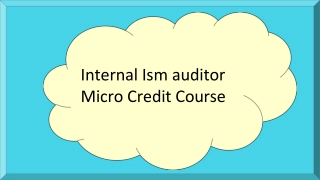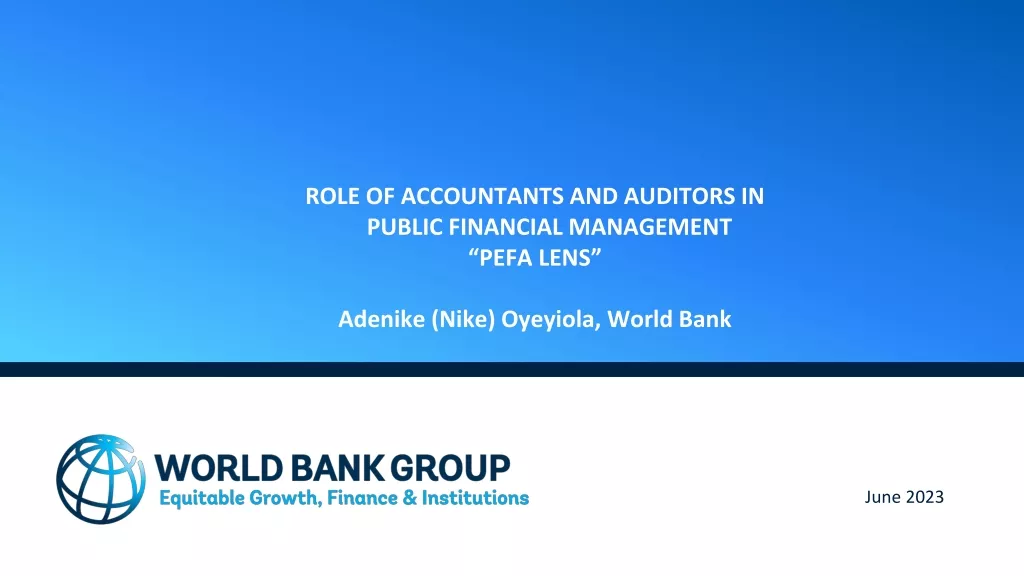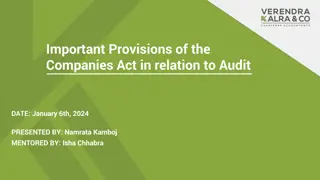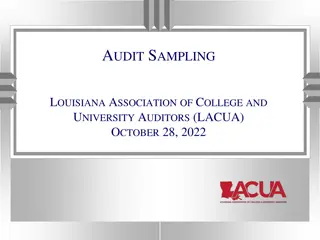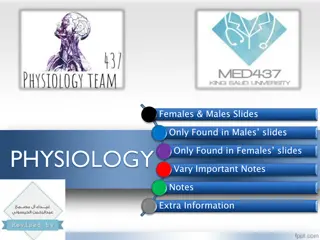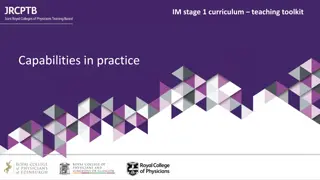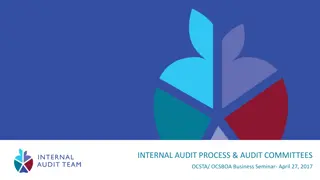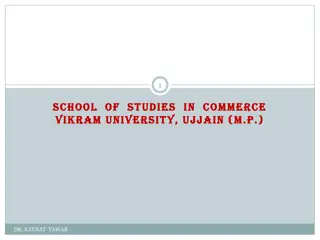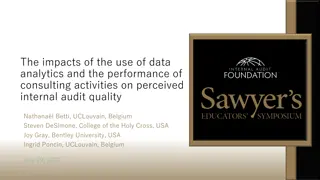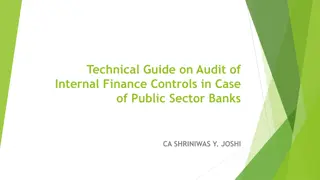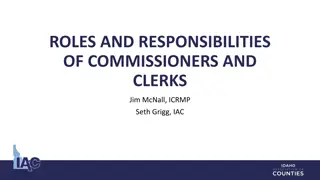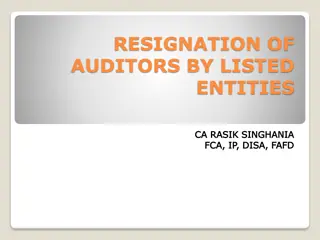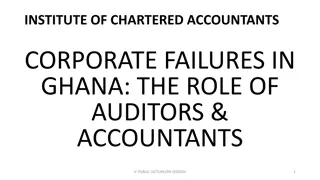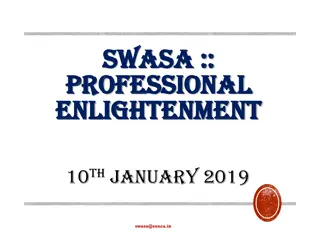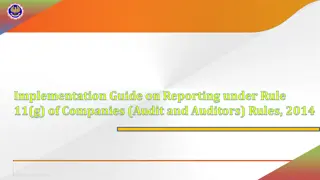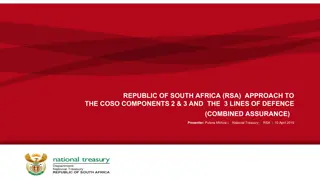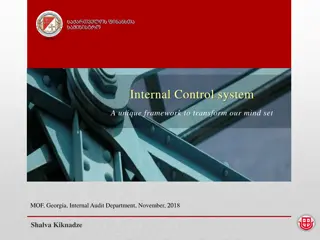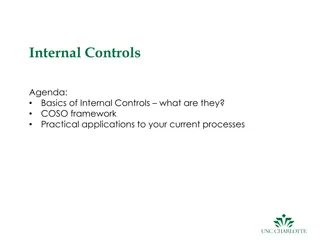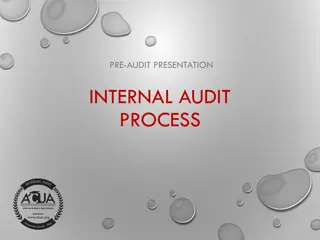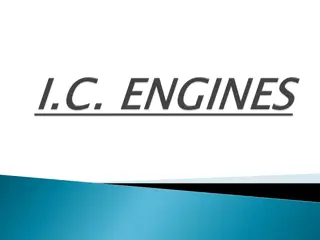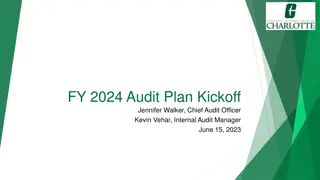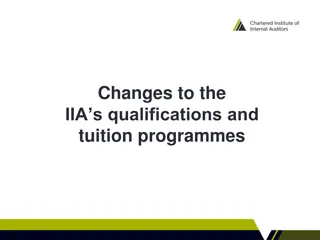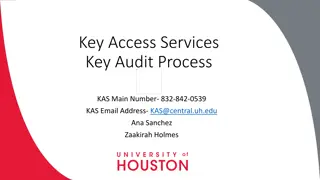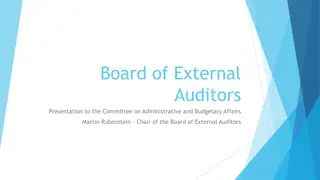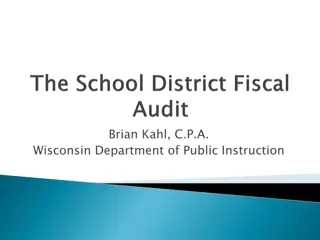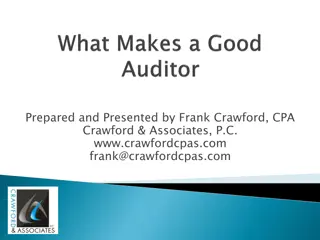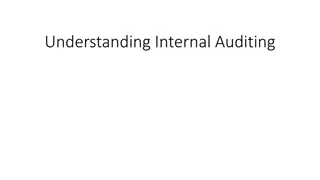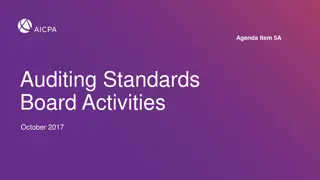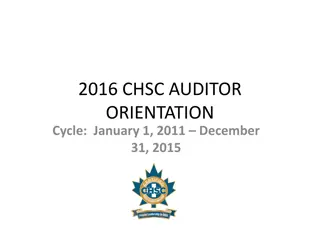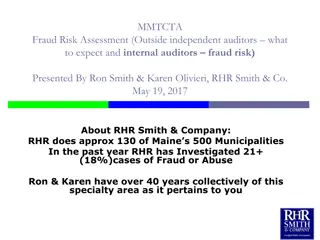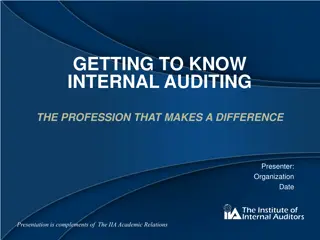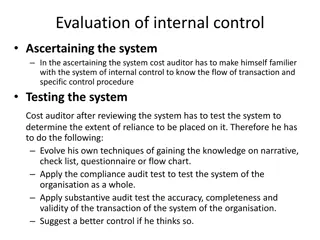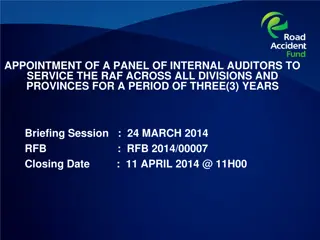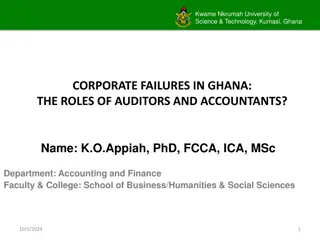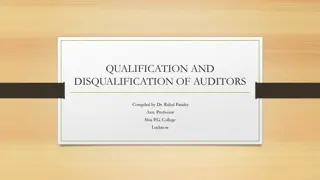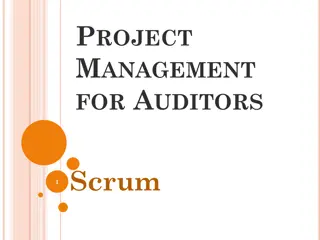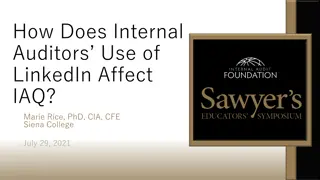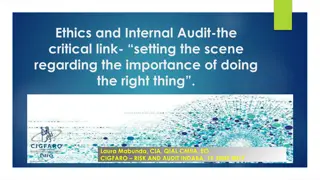Internal Ism auditor
Amidst the maritime industry's stringent safety regulations, the Internal ISM Auditor Micro Credit Course aims to equip participants with the necessary auditing skills to ensure compliance with the ISM Code. This course delves into the importance of internal audits for ship safety, emphasizing the s
0 views • 29 slides
The Role of Accountants and Auditors in Public Financial Management through PEFA Lens
Accountants and auditors play a crucial role in public financial management, especially in the face of global challenges like COVID, climate change, and conflict. The PEFA framework provides a comprehensive analysis of Public Financial Management (PFM) performance, assessing its impact on key budget
0 views • 17 slides
Exploring Hybrid Auditing Methods in Corporate Governance
Project led by Gunilla Eklöv Alander delves into assessing security in corporate governance without an internal audit function. The study examines various professions contributing to digitalized internal control environments and analyzes the traditional division of responsibilities between internal
2 views • 8 slides
Important Provisions of Companies Act Regarding Audit
The Companies Act mandates specific provisions related to audit, including the appointment of auditors, consent, certificates, and rotation requirements. Companies need to appoint auditors timely, obtain consent and eligibility certificates before appointment, and adhere to mandatory auditor rotatio
2 views • 22 slides
Audit Sampling Guidelines and Reference Materials for Internal Auditors
Review authoritative guidance for audit sampling and the potential for external auditor reliance on internal auditors. Understand and apply concepts related to audit sampling to project results with certainty. Available reference materials include AICPA Codification of Statements, AICPA Audit Guide,
6 views • 114 slides
Understanding Homeostasis: Maintaining Internal Balance in the Body
The concept of homeostasis is crucial for understanding how the body maintains a stable internal environment despite external fluctuations. This presentation covers the definitions of positive and negative feedback mechanisms, components of feedback loops, and the role of homeostatic mechanisms in p
0 views • 33 slides
Internal Medicine Stage 1 Curriculum Teaching Toolkit: Capabilities in Practice
Capabilities in Practice (CiPs) describe the professional tasks within the scope of internal medicine, utilizing expert assessors for assessment validity. There are 14 CiPs as learning outcomes for internal medicine Stage 1, with descriptors, performance levels, and evidence for entrustment decision
0 views • 11 slides
Internal Audit Process & Audit Committees Overview
Explore the functions and responsibilities of internal audit processes and audit committees in the context of school boards in Ontario. Covering topics such as governance, risk management, compliance, and internal controls, the content delves into the structure, mandate, and activities of internal a
2 views • 34 slides
Audit of Insurance Companies: Overview and Key Topics
Explore the essential aspects of auditing insurance companies, covering relevant topics such as corporate governance guidelines, appointment of auditors, rights and duties of branch auditors, internal control systems, and reporting requirements. Gain insights into the legislative framework, audit pr
0 views • 48 slides
Impact of Data Analytics and Consulting Activities on Internal Audit Quality
This research examines how the use of data analytics and consulting activities affect perceived internal audit quality. The study investigates the relationship between these factors and top management's perception of internal audit quality. Through online scenario-based experiments with middle and t
2 views • 11 slides
Technical Guide on Audit of Internal Finance Controls in Public Sector Banks
This technical guide provides insights into the audit of internal finance controls in public sector banks, covering topics such as joint auditors' responsibilities, common controls, centralized controls, business cycles, entity level controls, IT controls, reporting processes, and more. It offers de
2 views • 6 slides
Roles and Responsibilities of County Commissioners and Clerks in Idaho
The roles and responsibilities of county commissioners, clerks, auditors, and the board in Idaho entail a variety of duties such as managing budgets, recording board proceedings, overseeing elections, enacting ordinances, and more. Commissioners serve as the executive, legislative, and quasi-judicia
0 views • 23 slides
Rising Auditor Resignations in Listed Entities: Shocking Trends Revealed
Amidst a surge in auditor resignations at listed firms, a total of 204 companies saw auditors stepping down between January 1, 2018, and July 17, 2018. The trend continued with 32 auditors resigning in the last 5 months, shaping an alarming pattern in the financial sector. Key players like Price Wat
0 views • 33 slides
Corporate Failures in Ghana: The Role of Auditors & Accountants
Corporate failure in Ghana is characterized by discontinuation of company operations due to poor management, incompetence, and bad marketing strategies. This leads to an inability to generate sufficient revenue to cover business expenses. The lecture by Dr. Seddoh outlines the basic symptoms and cau
1 views • 32 slides
Understanding Internal Financial Controls and Regulatory Mandates
This content provides insights into Internal Financial Controls (IFC) and its significance in ensuring efficiency, fraud prevention, accuracy in accounting, and timely financial reporting. It also delves into regulatory mandates under the Companies Act of 2013, specifying requirements for auditors'
1 views • 19 slides
Implementation Guide on Reporting under Rule 11(g) of Companies (Audit and Auditors) Rules, 2014
This comprehensive guide covers the provisions, objective, and important terms related to reporting under Rule 11(g) of Companies (Audit and Auditors) Rules, 2014. It discusses the importance of maintaining proper books of accounts, introduces the concept of audit trail, explains crucial terms like
2 views • 49 slides
Republic of South Africa (RSA): COSO Components 2 & 3 with 3 Lines of Defence Approach
The presentation delves into RSA's approach to the COSO components, focusing on Risk Assessment and Internal Controls. It discusses the legislative mandate, Treasury regulations, and the COSO Internal Control Integrated Framework. The Risk Assessment section covers levels, matrices, and key instrume
0 views • 13 slides
Understanding Internal Control Systems and Processes in Organizations
Internal control systems play a vital role in governance and risk management within organizations. They encompass processes, measures, and outcomes that help in achieving objectives, ensuring compliance, safeguarding resources, and managing information systems effectively. This framework involves ma
0 views • 16 slides
Understanding Internal Controls and the COSO Framework
Internal controls play a vital role in organizations, providing reasonable assurance on achieving objectives. The COSO framework outlines the five integrated components of internal control, emphasizing the importance of control environment, risk assessment, control activities, information, and monit
1 views • 18 slides
Understanding Internal Audit and Controls Process
This content provides an overview of the pre-audit presentation, objectives of the presentation, the definition of internal audit, the role of internal audit in examining university departments, the university audit process, internal audit reporting lines, and insights on internal controls in an org
3 views • 30 slides
Road Safety Audit Seminar Update - May 2018
Latest statistics and updates from the Road Safety Audit Seminar held in May 2018, covering a comprehensive overview of 17 years of road safety audit data, including the number of auditors registered, team leaders, active auditors, completed audits from 2010-2017, and updates on the latest standards
0 views • 26 slides
Overview of Internal Combustion Engines and Their Components
Internal combustion engines are devices that convert fuel's chemical energy into thermal energy, which is then used to produce mechanical work. The engines can be classified into two types - External Combustion Engines and Internal Combustion Engines. Internal combustion engines include components l
2 views • 53 slides
Internal Audit Department Overview
The Internal Audit Department at the University of North Carolina Charlotte is led by Chief Audit Officer Jennifer Walker and Internal Audit Manager Kevin Vehar. The team provides risk-based assurance, advisory services, and investigations to enhance organizational value. Their mission is to offer o
1 views • 17 slides
Changes to IIA Qualifications and Tuition Programmes
The International Internal Auditors (IIA) is making changes to its qualifications and tuition programmes, phasing out the IIA Diploma and introducing the Certified Internal Auditor (CIA) and Qualification in Internal Audit Leadership (QIAL). Transition arrangements are in place for current students,
1 views • 14 slides
Key Access Services Audit Process Overview
This document provides a detailed guide on the Key Access Services Audit Process, including key steps for certifying signatories, assigning Key Auditors, and completing Key Audits. It covers processes for assigning auditors to departments, completing audits, and verifying audit results. Instructions
1 views • 14 slides
Board of External Auditors Presentation Highlights
The presentation by Martin Rubenstein, the Chair of the Board of External Auditors, outlines the responsibilities, membership, and mandate of the board in conducting external audits of the financial accounts of the OAS. Key findings and recommendations regarding accounting practices, liquidity issue
0 views • 6 slides
Auditing Standards and Requirements in Wisconsin Department of Public Instruction
Understanding the auditing standards and requirements for financial statements audits in the Wisconsin Department of Public Instruction, including the role of management, statements on auditing standards, independence criteria, technical training needed for auditors, and services performed by indepe
3 views • 70 slides
Attributes of Good and Expert Auditors Exploration
This session explores the attributes that distinguish GOOD and EXPERT auditors, allowing participants to rank their importance. A comparison with a U.S. study will be conducted, and a catchphrase identifying essential auditor traits will be developed. Attributes such as creativity, judgment, knowled
0 views • 14 slides
Understanding Internal Auditing: Role and Importance
Internal Audit Department exists to provide independent assurance, consulting services, and improve operations by evaluating risk management, internal controls, and governance processes. It reports to the campus president and the Director of System-wide Internal Audit at TBR while serving the colleg
0 views • 7 slides
Understanding SAS 132: Auditors' Consideration of Going Concern
The recently issued SAS 132 supersedes SAS 126 and focuses on auditors' evaluation of the entity's ability to continue as a going concern. It outlines the objectives, changes required, evaluation period, addressing significant delays in issuance, and reporting on the use of going concern basis of ac
0 views • 30 slides
CHSC Auditor Orientation and Qualifications Overview
The CHSC Auditor Orientation cycle from January 1, 2011, to December 31, 2015, outlines the qualifications and responsibilities of auditors within the CHSC organization. Auditors are required to uphold the integrity of the designation, conduct audits in a fair and transparent manner, and follow spec
0 views • 20 slides
Fraud Risk Assessment and Internal Controls Overview
This presentation by Ron Smith & Karen Olivieri from RHR Smith & Co discusses fraud risk assessment, the definition of fraud, types of fraud, fraudster statistics, and the importance of internal controls in preventing and detecting fraud. They also delve into the responsibilities of auditors in prov
0 views • 42 slides
Understanding Internal Auditing: A Profession of Value
Internal auditing is an independent, objective activity that enhances organizational operations by evaluating risk management, control, and governance processes. Internal auditors assess risks, evaluate controls, suggest improvements, ensure compliance, and detect fraud. They play a crucial role in
0 views • 16 slides
Understanding Internal Control Evaluation Methods in Auditing
Auditors need to evaluate internal control systems by familiarizing themselves with the flow of transactions and control procedures. They must develop techniques like narratives, checklists, and questionnaires for testing, assess the impact of errors, report weaknesses, and determine reliance on the
0 views • 18 slides
Appointment of Internal Auditors for the Road Accident Fund: RFB 2014/00007 Briefing & Timelines
The Road Accident Fund (RAF) is appointing a panel of internal auditors to service all divisions and provinces for a three-year period. The RFB includes details on the briefing session, background, scope of work, timelines, bid evaluation, pricing schedule, and submission requirements. The RAF's man
0 views • 22 slides
Corporate Failures in Ghana: Roles of Auditors and Accountants
This study conducted at Kwame Nkrumah University of Science & Technology, Kumasi, Ghana, explores the causes of corporate crises in Ghana and the roles played by auditors and accountants. The research aims to identify common business areas contributing to corporate crises and internal factors leadin
0 views • 53 slides
Qualification and Disqualification of Auditors in Company Law
A detailed overview of the eligibility criteria, qualifications, and disqualifications for auditors as per Section 141 of the Companies Act, 2013. It covers the requirements for appointment, restrictions on rendering certain services, holding interests in the company, indebtedness limits, business r
0 views • 7 slides
Scrum Basics for Auditors: Enhancing Project Management Efficiency
Explore the fundamentals of Scrum methodology tailored for auditors, enabling impactful teamwork, accountability, and transparency. Discover key terminology, roles, and processes to streamline project management and achieve audit objectives effectively.
0 views • 18 slides
Impact of Internal Auditors' Use of LinkedIn on IAQ
Utilizing LinkedIn can affect Internal Audit Quality (IAQ) through social network measurement, implicit knowledge-sharing, and sentiment analysis. Factors such as posting frequency, mechanisms for expressing opinions, and formal/informal measures of competence play a role. Preliminary steps involve
0 views • 12 slides
Importance of Ethics in Internal Audit Practices
Ethics play a crucial role in internal audit, ensuring good governance, trust, and accountability. This article explores the definition of ethics, ethical culture, the IIAs Code of Ethics for Internal Auditors, and the significance of upholding ethical standards in conducting internal audit work.
0 views • 52 slides
